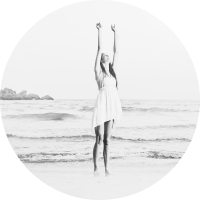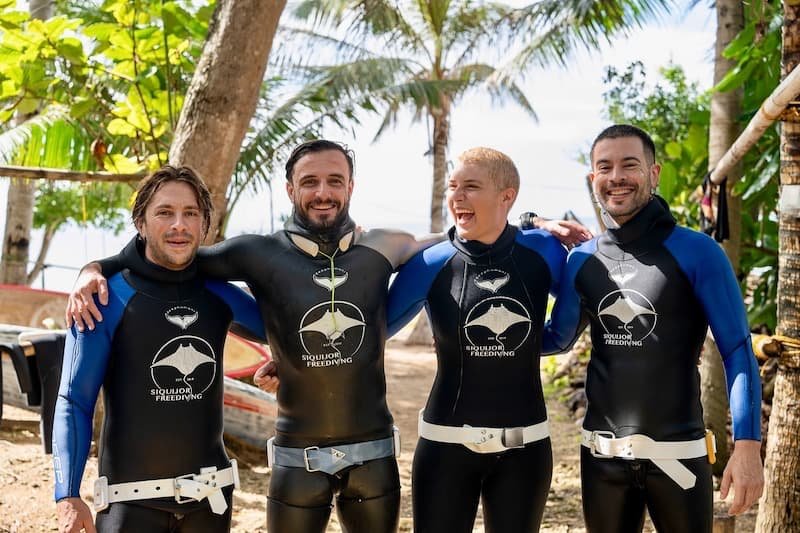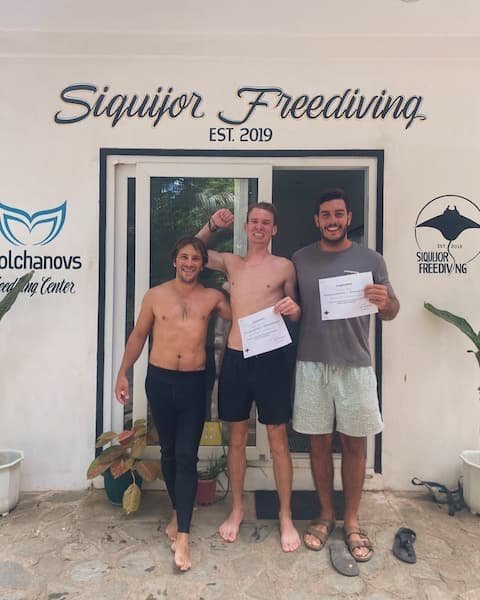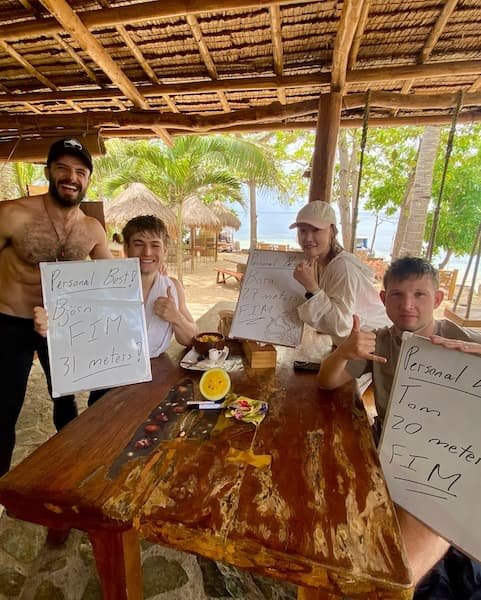
 Katie Wood
Freediver, Writer, Explorer
Katie Wood
Freediver, Writer, Explorer

 Katie Wood
Freediver, Writer, Explorer
Katie Wood
Freediver, Writer, Explorer
Let’s be honest. Freediving isn’t just about holding your breath. It’s about holding space — for silence, for depth, for the wild. And when we enter that space, something ancient and intimate unfolds. No tanks. No noise. Just the soft pulse of your heart and the rhythm of the sea. That’s what makes freediving different. It’s not a sport we do on top of the ocean — it’s one we do inside it. And that’s exactly why every freediving school, without exception, should be teaching sustainability.
Because when we immerse ourselves in the ocean, we don’t just visit it — we become part of it. And if we’re going to benefit from that connection, we need to take responsibility for it. Let’s unpack what that means.
Freediving is a gateway drug to falling in love with the sea.
There’s a reason people leave their jobs, sell their belongings, and move to coastal towns after discovering apnea. There’s a reason we wake up at dawn to put on a wetsuit and slip into the swell before the tourists arrive. Freediving changes how we see the water — not just as a backdrop for recreation, but as a living, breathing system we’re embedded in.
You begin to notice things. The shift in thermoclines. The plastic caught on reef branches. The sudden absence of fish that were always there last year. The moments when a pod of dolphins comes in close, but swims past faster than usual.
These things stick. And slowly, freedivers become quiet observers of a natural world under stress.
But observation isn’t enough. Schools are in a unique position to bridge that gap — to turn awareness into action.

Photo by Siquijor Freediving
Let’s get one thing clear: freediving schools aren’t just service providers. They are culture makers.
Whether you're a total beginner learning to equalize or a competitive diver chasing 80 meters, your school — and your instructor — shape the way you think about diving. About safety. About risk. About performance. About self.
And yes, about the ocean.
You learn how to breathe before you learn how to kick. You learn to relax before you learn to descend. You learn to listen — to your body, your buddy, your surroundings. All of these things are philosophical before they’re physical.
So when a school teaches you to respect your body, but not the reef beneath you — something’s off. When you’re taught to dive deep, but not how to leave no trace — something’s missing.
There’s a moral obligation here. Freediving schools are gatekeepers to a deeper relationship with the sea. And every gate should open with a lesson on sustainability.
Some schools treat sustainability like an add-on. An extra slide at the end of the slideshow. A logo on the wall. A beach cleanup once a year. It’s better than nothing, but it’s not enough.
In a world where coral bleaching, overfishing, and plastic pollution are accelerating, we can’t afford to treat sustainability as an optional module. It needs to be built into the DNA of freediving education.
That doesn’t mean turning every course into an environmental science lecture. It means integrating simple, impactful principles throughout the experience. Things like:
The best schools already do this. But it’s time for all of them to catch up.

Photo by Siquijor Freediving
Here’s the thing: if you’re a freediver, people are watching you.
Maybe not on Instagram (although probably there, too). But definitely on the boat. At the beach. In your community. Diving is one of those activities that commands attention. It looks beautiful. It seems mysterious. And it raises questions.
When people see you go deep on a single breath, they’re curious. When they hear that you don’t use tanks, they want to know more. When they learn that you dive with whales, they’re amazed.
You’re an ambassador — whether you signed up for the role or not.
That’s why sustainability education matters so much at the entry point. Freedivers go on to become instructors, spearos, underwater photographers, marine researchers, and citizen scientists. Or they just talk to their friends and families. Either way, they spread the culture.
If we seed that culture with environmental responsibility early on, we change the game.
Let’s pause for a moment and talk about ego.
Freediving is full of personal bests. Depths, times, achievements. And yes — progression is motivating. It’s part of the thrill. But there’s a danger in making it the only goal.
Because the ocean doesn’t care about your personal best. It cares whether it can sustain life in five, ten, fifty years. It cares whether there will be fish to see, reefs to explore, kelp forests to glide through.
If freediving becomes just another metric-based sport — with no emphasis on preservation — we risk becoming extractive tourists, not mindful participants.
Schools have the power to shift that narrative. To remind divers that immersion is a privilege. And that responsibility is the price of admission.

Photo by Siquijor Freediving
Let’s get practical.
What should a sustainability-conscious freediving school actually do?
Curriculum integration: Add a sustainability section to every beginner course. Not just theory, but direct application.
Local knowledge: Work with marine biologists or conservationists to educate students on regional issues — from overfishing to coral health.
Responsible spearfishing: If offering spearfishing courses, make ethics non-negotiable. Teach size limits, species protection, seasonal awareness, and restraint.
Gear advice: Recommend products that are durable, repairable, and built to last. Discourage fast-gear purchases and highlight waste reduction.
Citizen science: Partner with NGOs and invite divers to participate in reef monitoring, fish counts, or ocean cleanups.
Transparency: Be honest about the school’s own environmental impact — and what steps it’s taking to reduce it.
None of this needs to be preachy. It just needs to be present.
When done right, students leave not just with a certification — but with a shift in perspective.
Here’s the hard truth: if we’re not protecting the ocean, we’re just using it. And that’s not what freediving was meant to be. This isn’t about guilt or shame. It’s about integrity. About making sure the very thing we love stays intact for those who come after us. About turning a personal practice into a collective responsibility. Freediving gives us so much — awe, clarity, challenge, beauty. The least we can do is give something back.
If you run a freediving school, ask yourself: are we teaching sustainability, or are we avoiding the topic because it’s inconvenient? If you’re a student, ask your instructors: what are we doing to care for the places we dive? And if you’re a brand, a content creator, or just a lover of the sea — use your platform to educate, advocate, and inspire change. The ocean is changing — fast. The question is whether we’ll change fast enough with it.